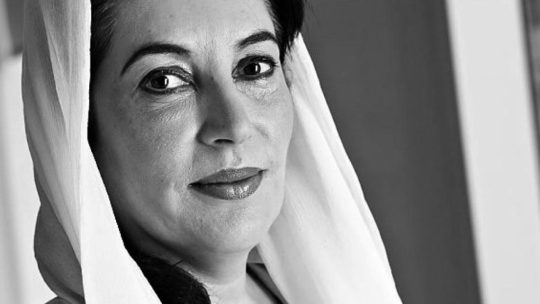#Jeay Bhutto
Text
Remembering Benazir

Fifteen years ago, the world lost a truly extraordinary woman when Benazir Bhutto, former prime minister of Pakistan, and global leader for democracy, freedom and human rights was assassinated.
I was honored and blessed to call her a friend. She is an eternal inspiration and her heart and courage remain a light in this dark world.
Many years ago, soon after her death, I launched a movement and petition seeking to have Benazir posthumously awarded the Congressional Gold Medal. I wrote the text of this essay and petition fourteen years ago and am still hoping and striving to one day see this special event and honor for Benazir's life, legacy and memory come to pass. If you would like to sign the petition, you can do so here:
https://www.thepetitionsite.com/1/honor-benazir-congressional-gold-medal/
🕯️❤️ 🕊️
#benazir bhutto#Bibi#Benazir#democracy#pakistan#women#human rights#in memoriam#in memory#congressional gold medal#Jeay Bhutto#Salaam Benazir
1 note
·
View note
Text
G. M. Syed
G. M. Syed (Sindhi: سائين جي ايم سيد) (January 17, 1904 – April 25, 1995) was a political leader who pioneered the Jeay Sindh movement for the freedom of Sindh from Pakistan. He is regarded as one of the founding fathers of modern Sindhi nationalism. In 1930 he founded the Sindh Hari Committee, later led by Hyder Bux Jatoi.[1]
He was known by the people of Sindh as "Saeen" (سائين), son of Syed Mohammed Shah Kazmi, descendant of a famous saint of Sindh, Syed Haider Shah Kazmi, of whose mausoleum he is the Sajjada Nashin.
Political activism
He was the founder of Sindh Awami Mahaz, which went on to join the National Awami Party (National Peoples Party). Like Ibrahim Joyo, G.M. Syed blended Sindhi nationalism with Communism and Sufism through the ideas of Gandhi and Marx. In his early political life, he was a strong vocal supporter of the Pakistan Movement in Sindh and was said to be one of the driving forces in making sure the Sind Assembly voted to join Pakistan in 1947.
Timeline
At the early age of fourteen years, Syed started his career as an activist.
In 1919 he became Chairman of the School Board of his own tehsil. Subsequently, he was elected as a President of Karachi District Local Board in 1929. He later became its President.
In 1930, he organized the Sindh Hari (Peasants) Conference and became its Secretary.
In 1937, he was for the first time elected a member of Sindh Legislative Assembly.
In 1938, he joined the All-India Muslim League. In 1940, he became Minister of Education in Sindh.
In 1941, he became one of the members of the Central Committee of the Muslim League.
In 1943, he became President of the Sindh Muslim League.
In 1944, he played a pivotal role in politics and got a resolution passed in the Sindh Assembly in favor of Pakistan, which was the first resolution of its kind in the whole of undivided India.
In 1946, conditions compelled him to dissociate from the Muslim League, and formed a new party named the Progressive Muslim League. The same year, he was elected as leader of the Coalition Party in the Sindh Assembly.
In 1954, he acted as Chairman of Sindhi Adabi Board.
In 1955, he played an active part in the formation of the Pakistan National Party.
In 1966, he founded Bazm-e-Soofia-e Sindh.
In 1969, he formed the Sindh United Front.
In 1972, he formed Jeay Sindh Mahaz.
Literary contribution
Syed was the author of more than Forty nine books. His books are on numerous subjects, ranging from literature to politics, religion and culture. He was himself a mystic had a lot of love and regard for mystics of all faiths. Besides being a man of immense learning, Syed possessed a personality that was graceful and poised. Highly cultured and refined manners, hospitality and geniality were the salient traits of his character. Wit and humor were the keynotes of his personality. He respected all genuine difference of opinions. For decades, Sindh and Sindhi people had constituted the center of his interest and activity, and all his love energies were devoted to their good. His famous Books are Janam Guzarium Jin Sein.(Sindhi) Dayar Dil Dastan-e- Muhabt.(Sindhi) Sindh Ja Soorma.(Sindhi) Sindh speaks.(English) Struggle for New Sindh.(English) Religion and Reality.(English) Shah Latif's Message.(English)
GM Syed proposed the 1940 Pakistan Resolution in the Sindh Assembly, which ultimately resulted in the creation of Pakistan. However, he became the first political prisoner of Pakistan because of his differences with the leadership of the country, as he believed that they had deceived the Sindhis.
Jeay Sindh movement
In 1971, when East Pakistan (now Bangladesh) seceded from Pakistan at the behest of Zulfiqar Ali Bhutto who wanted to come in power in West Pakistan. Saieen G.M. Syed began to demand self-determination for the people of Sindh. In 1972 he founded the Jeay Sindh movement, aimed at establishing an independent/autonomous Sindhi state ('Sindhu Desh') on the concept of Bangladesh. For his political views against the Islamic Republic of Pakistan, he was kept either in jail or in solitary confinement for a period of more than 30 years.
On 19 January 1992, G.M. Syed was put under house arrest and his house was declared a sub-jail. He was detained until his death.
#Sindh Hari Committee#Sindh#Pakistan#National Peoples Party#Karachi#Hyder Bux Jatoi#G.M Syed#All-India Muslim League
0 notes
Text
May 22, 2012
BHUTTO
Muzafar Bhutto was a Sindhi nationalist politician who served as the Secretary General of the Jeay Sindh Muttahida Mahaz (JSMM). His bullet-riddled body was found at a roadside near Hatri bypass bearing torture marks after he went missing on February 24, 2011. He was allegedly killed by The Inter Services Intelligence.
0 notes